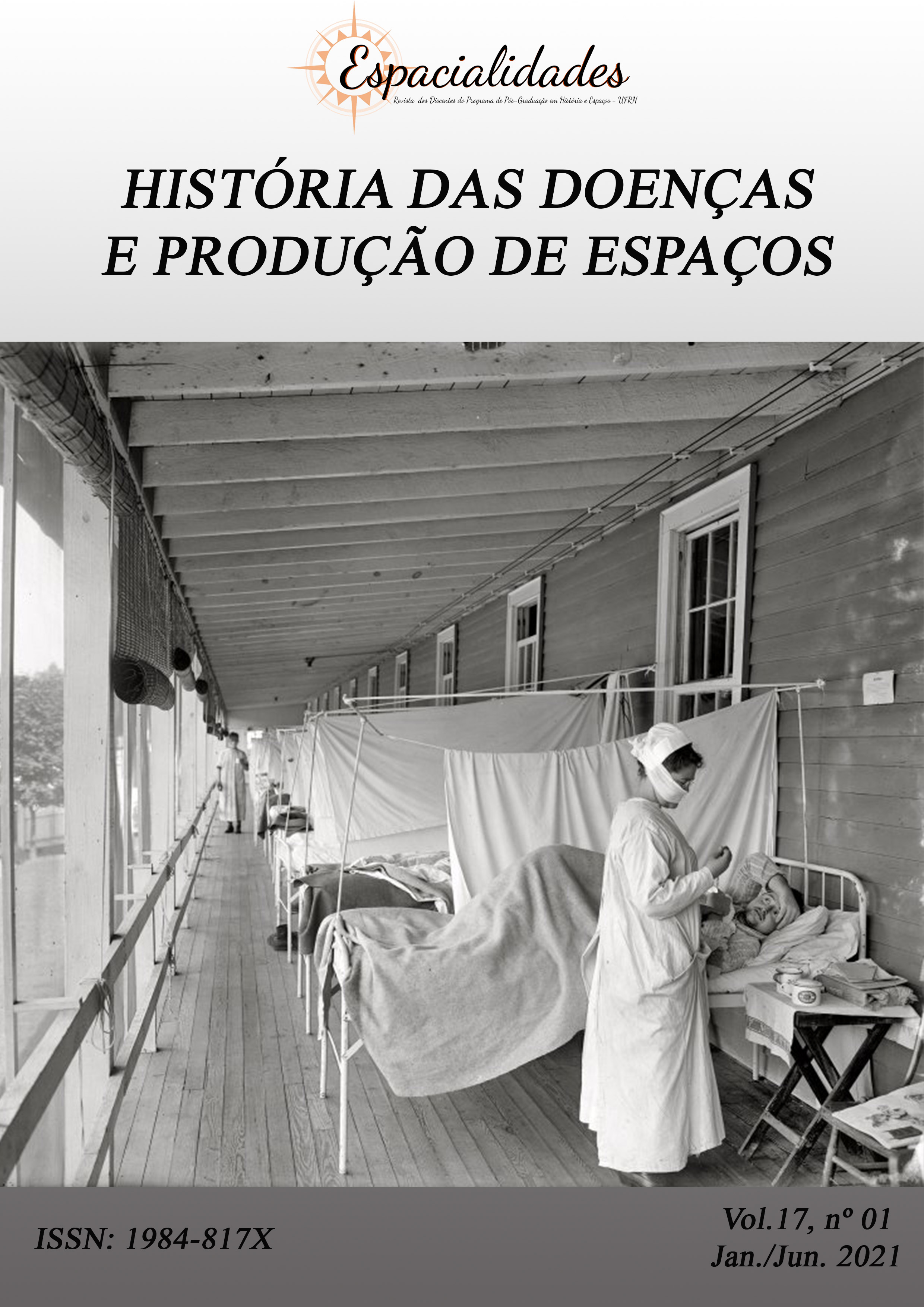Disease and spatiality in Sophocles’ Oedipus Tyrannus
DOI:
https://doi.org/10.21680/1984-817X.2021v17n1ID21999Keywords:
disease; space; tragedy; plague; Oedipus.Abstract
This paper aims to examine disease and space in Greek tragedy, building on studies about disease (nósos) and its representations, in an analysis of Sophocles’s Oedipus Tyrannus (427 BCE) in relation to the plague that afflicted Athens between 430 and 426 BCE. Our starting hypothesis is that this plague transformed how Athens perceived their social institutions. This study examines tragic vocabulary and the relations between disease and space developed in the play.
Downloads
References
REFERÊNCIAS
ANDERSON, Michael J. Myth. In: GREGORY, Justina (ed.). A companion to Greek tragedy. S/l: Blackwell Publishing, 2005. pp. 121-135.
BACELAR, Agatha Pitombo. Tragoidíai: cantos de cura: representações da doença nos cultos dionisíacos e em tragédias de Sófocles. 2018. 322 f. Tese (Doutorado em Linguística) – Universidade de Brasília, Brasília, 2018.
BURIAN, Peter. Myth into muthos: the shaping of tragic plot. In: EASTERLING, P.E. The Cambridge Companion to Greek Tragedy. Cambridge: CUP, 1997. pp. 178-208.
BURKERT, Walter. The Orientalizing Revolution. Cambridge (US): Harvard UP, 1992.
CUSSET, Christophe. La tragédie grecque. Paris: Éd. du Seuil, 1997.
DAGIOS, Mateus. Pólis enferma: Nósos e a representação do lógos sofístico nas tragédias Filoctetes de Sófocles e Orestes de Eurípides. 2019. 255 f. Tese (Doutorado em História) – Universidade Federal do Rio Grande do Sul, Porto Alegre, 2019.
DUMANOIR, Jean-Richard. Les mondes virtuels de Sophocle. In: Le théâtre grec antique : la tragédie. Actes du 8ème colloque de la Villa Kérylos à Beaulieu-sur-Mer les 3 & 4 octobre 1997. Paris: Académie des Inscriptions et Belles-Lettres, 1998. pp. 59- 84. (Cahiers de la Villa Kérylos, 8)
FINLEY, M. I. Democracia antiga e moderna. Rio de Janeiro: Graal, 1988.
GOLDHILL, Simon. The language of tragedy: rhetoric and communication. In: EASTERLING, P.E. The Cambridge Companion to Greek Tragedy. Cambridge: CUP, 1997. pp. 127-150.
GRIMAL, Pierre. O Teatro Antigo. Lisboa: Edições 70, 1986.
KNOX, Bernard. The Date of the Oedipus Tyrannus of Sophocles. The American Journal of Philology. Vol. 77, No. 2, 1956. pp. 133-147.
KNOX, Bernard. Édipo em Tebas. São Paulo: Perspectiva, 2002.
LABEY, Pauline. L’histoire du malade. Croisement de deux anthropologies. L’Atelier du Centre de Recherches Historiques. S/l, 06 mai 2010.
LAPLANTINE, François. Antropologia da doença. São Paulo: Martins Fontes, 1991.
LE GOFF, Jacques. As doenças têm história. Lisboa: Terramar, 1997.
LIDDELL, Henry; SCOTT, Robert. A Greek-English Lexicon. Oxford: OUP, 1940.
LLOYD, G.E.R. In the Grip of Disease: studies in the Greek Imagination. Oxford: Oxford University Press, 2003.
MARSHALL, Francisco. Édipo filósofo, inocente responsável. Filosofia Unisinos. S/l, n. 8, pp. 49-59, 2007.
MEIER, Christian. La naissance du politique. Paris: Gallimard, 1996.
MEIER, Christian. De la tragédie grecque comme art politique. Paris: Les Belles Lettres, 2004.
MITCHELL-BOYASK, Robin. Heroic Pharmacology: Sophocles and the language of Early Greek Medicine. In: MARKANTONATOS, Andreas (ed.). A Companion to Sophocles. Leiden: Brill, 2012.
MOSSÉ, Claude. As lições de Hipócrates. In: LE GOFF, Jacques. As doenças têm história. Lisboa: Terramar, 1997.
PARRY, Adam. The Language of Thucydides’ Description of the Plague. Bulletin of the Institute of Classical Studies. No. 16, pp. 106-118, 1969.
REHM, Rush. The Play of Space: Spatial Transformation in Greek Tragedy. New Jersey: Princeton University Press, 2002.
SENNETT, Richard. Carne e pedra: o corpo e a cidade na civilização ocidental. Rio de Janeiro: Record, 2008.
SMITH, Wesley D. Disease in Euripides' Orestes. Hermes. 95 Bd., H. 3, pp. 291-307, 1967.
SÓFOCLES. Édipo Tirano. Tradução de Leonardo Antunes. São Paulo: Todavia, 2018.
SOPHOCLE. Tragédies. Tome II : Ajax - Œdipe Roi – Electre. Texte établi par : Alphonse Dain, Jean Irigoin, Traduit par : Paul Mazon. Paris: Les Belles Lettres, 1981.
SONTAG, Susan. Doença como metáfora. AIDS e suas metáforas. São Paulo: Companhia das Letras, 2007.
THIERCY, Pascal. Tragédias gregas. Porto Alegre: L&PM, 2009.
THUCYDIDE. La Guerre du Péloponnese. Texte établi et traduit par Jacqueline de Romilly. Livres II et IV. Paris: Belles Lettres, 1962.
TUCÍDIDES. História da Guerra do Peloponeso. Tradução de Mario da Gama Kury. Brasília: Editora da Unb, 1987.
VERNANT, Jean-Pierre. Édipo sem Complexo. In: VERNANT, Jean-Pierre; VIDAL-NAQUET, Pierre. Mito e tragédia na Grécia Antiga. São Paulo: Perspectiva, 1999a. pp. 53-71.
VERNANT, Jean-Pierre. O Deus da Ficção Trágica. In: VERNANT, Jean-Pierre; VIDAL-NAQUET, Pierre. Mito e tragédia na Grécia Antiga. São Paulo: Perspectiva, 1999b. pp. 157-162.
VERNANT, Jean-Pierre. Ambigüidade e Reviravolta. Sobre a Estrutura Enigmática de Édipo-Rei. In: VERNANT, Jean-Pierre; VIDAL-NAQUET, Pierre. Mito e tragédia na Grécia Antiga. São Paulo: Perspectiva, 1999c. pp. 73-99.
Downloads
Published
How to Cite
Issue
Section
License
The submission of manuscripts to this journal implies the transfer, by the authors, of the rights of printed and digital publication. The authors own copyrights to the works they have created and grant to the journal the right to initial publication, with simultaneous work licensed under the Creative Commons License CC BY-NC-SA 4.0, and for publication rights. The authors can publish their work online in institutional/disciplinary repositories or in their own websites. Authors can only use the same results in other publications, clearly indicating this journal as the means of the original publication.
The author also agrees to submit the work to the publication rules of the Espacialidades Journal mentioned above.
Espacialidades Journal is an open access journal under the Creative Commons Attribution-NonCommercial-ShareAlike 4.0 International License (CC BY-NC-SA 4.0)




